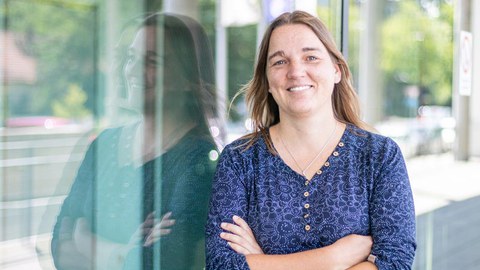Feb 11, 2021
#WomenInScience - Interview with BIOTEC group leader Dr. Anna Poetsch

Dr. Anna Poetsch
Today is the International Day of Women and Girls in Science, a day to celebrate the critical role of women and girls in science and technology. It is a perfect occasion to feature one of our group leaders Dr. Anna Poetsch, a Mildred Scheel early Career Center (MSNZ) research group leader at the Biotechnology Center (BIOTEC) at TU Dresden and the National Center for Tumor Diseases (NCT).
What is your research group working on?
We try to understand how our genome gets damaged and repaired, how it accumulates mutations that contribute to disease such as cancer. For this we are doing a lot of computer programming, because ultimately our genome is a string of three billion letters, so to make sense of it requires complex calculations.
Tell us more about your scientific journey. How did your career look so far?
I studied Life Science in the beautiful city of Konstanz and later in Tokyo. I then came back to Germany for a PhD at the German Cancer Research Center (DKFZ), but got pulled back into the world for my postdoctoral position, specifically London, UK and Okinawa, Japan. After a short stop in Vienna, I arrived in Dresden. I ended up working in three nation’s capitals, but ironically, I am a small town person with a love for water and the ocean.
Was there a challenge you are particularly proud of overcoming on your journey?
After completing my PhD, I took a huge risk to leave the wet lab and learn programming. It was a very intimidating endeavor. While I do not regret it because I love working interdisciplinarily, it had and still has its challenges. My work keeps being judged by people from different fields. I am proud to have made it this far, but I am not sure if I have overcome these challenges yet.
What was your dream occupation when you were a child?
I wanted to be an Antarctic zoologist. I loved penguins and everything related to the Antarctic. I still do, actually.
Career in science can be tough at times. What keeps you motivated to get going?
Curiosity, the urge to answer the questions I am interested in. Sometimes it can be a bit like a drug or workaholism. But in tough times it is also my anchor to keep going.
Can you think of the best day of your career? What happened?
The best day is hard to pick, because there were so many good ones. I am sure they will be topped by the day my first PhD student graduates. For now I would say that the best day was probably my first big talk as a young PhD student. I talked about my Master’s thesis at a conference at the European Molecular Biology Laboratory (EMBL) in Heidelberg, a very prestigious institute. I talked just after a Nobel Prize winner and was very nervous. I started off with a joke, which worked way better than I expected. It totally baffled me and the whole talk ended up being an amazing experience with an overwhelming feedback.
What do you think is the biggest challenge for women in science nowadays?
As a woman in a male dominated area of science I still struggle sometimes to be taken seriously. It is unconscious, but we still face the situation that we have to give more for our contribution to be recognized, for being listened to, for being heard, for our opinions to matter, for being included… It can be well seen in the statistics on authorships, scientific prizes, hiring decisions, conference invitations, speaking time in meetings, etc. But these problems are getting more and more recognized, and there is a lot of ongoing effort to even it out.
How would you encourage the students to follow your footsteps?
Actually, I wouldn’t, because it was not an easy path. It was mine to go and I would not miss it, but everybody should find their own space to leave footsteps. I would encourage young people to do their best to figure out their own path, try different things and push towards the boundaries of their comfort zone as much as possible, but making sure that there is always somebody there for them, for the times when it goes wrong.
Would you recommend a career in science?
Yes, of course! It is not always easy, but it can be an amazing experience. A scientific career is also a good preparation for many other careers. I would not recommend for everyone to go all the way, but I would recommend to give it a shot and see where it is going.
